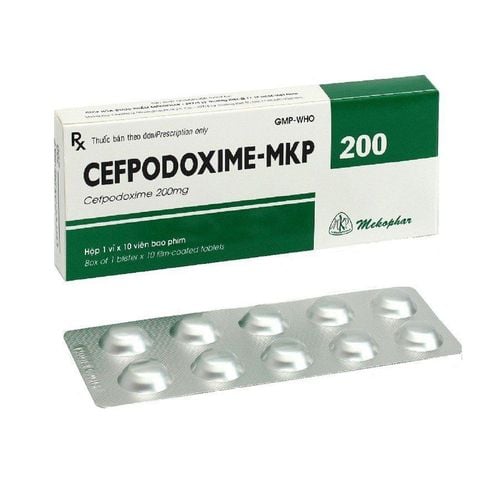This is an automatically translated article.
Mecefix is a 3rd generation cephalosporin antibiotic. The drug has an immediate effect on controlling pathogenic bacteria and is used in the treatment of respiratory tract infections, urinary tract infections,... To ensure To ensure effective use, users need to strictly follow the instructions of the doctor or pharmacist.
1. The effect of the drug Mecefix
Antibiotics Mecefix is a 3rd generation cephalosporin antibiotic that contains cefixime with bactericidal effect. Mecefix's bactericidal mechanism is similar to that of other cephalosporins in that it binds to target proteins that inhibit the synthesis of munopeptides in the bacterial cell wall. The mechanism of bacterial resistance to Mecefix is to help reduce the affinity of cefixime for the target protein or decrease the permeability of the bacterial cell membrane to the drug.
Several studies have shown that Mecefix is highly stable to the hydrolysis of beta-lactamases encoded by genes located on chromosomes and plasmids. The stability to beta-lactamase of Mecefix is higher than that of cefuroxime, cefoxitin, cefaclor, cephradin, cephalexin. In addition, Mecefix is active both in vitro and in clinical with most of the microorganisms such as gram-positive bacteria (streptococcus pyogenes, streptococcus pneumonia,...), gram-negative bacteria (neisseria gonorrhoeae, proteus mirabilis, haemophilus influenzae, escherichia coli,...).
Mecefix is indicated in such diseases as:
Uncomplicated urinary tract infections caused by susceptible hosts such as e.coli, proteus mirabilis,... and some cases of uncomplicated urinary tract infections symptoms caused by gram-negative bacilli. Pyelonephritis and urinary tract infections Middle ear infections caused by haemophilus influenzae, streptococcus pyogenes,... Pharyngitis and tonsillitis caused by streptococcus pyogenes Acute and chronic bronchitis caused by streptococcus pneumonia or haemophilus influenzae,... Pneumonia,... Community-acquired mild and moderate Gonorrhea uncomplicated neisseria gonorrhoeae In addition, some other drug effects not listed on the approved drug label, but in some cases the doctor may Indications for the use of Mecefix. Therefore, before taking the medicine, consult your doctor.
2. How to use Mecefix
Mecefix is made in the form of film-coated tablets. Dosage will be based on the condition and age of the patient.
For adults: the dose used in adults is 400mg/day and used 1-2 times 12 hours apart. In the case of uncomplicated cervical gonorrhea, a single oral dose of 400 mg is recommended. In the treatment of infections caused by streptococcus pyogenes, the duration of treatment with Mecefix is at least 10 days. For children over 12 years old and weighing over 50kg, the dose is the same as adults Children over 6 months old to 12 years old use a dose of 8mg/kg/day and can be used once a day or divided into 2 oral doses. 12 hours apart. Patients can take the drug with or without food, before or after eating. However, to reduce stomach irritation you can take it with food and need to swallow the tablet whole with a full glass of water, do not chew or break the tablet.
To use the drug safely, take Mecefix exactly as directed by your doctor, do not use more than the recommended dose, smaller or longer than prescribed. Use Mecefix regularly to get the most benefit from it and you can stop taking it if any new symptoms appear or the condition does not improve after 7 days. Patients absolutely do not abuse the drug for too long for a long time. This does not make the patient's condition better, but also increases the risk of unwanted effects.
3. Undesirable effects when using Mecefix
Mecefix can cause some unwanted and common side effects that can be mentioned as:
Stomach pain Diarrhea Vomiting Mild to severe skin rash Headache Itching Hives Difficulty breathing or swallowing Wheezing wheezing Before prescribing medicine, doctors always consider the benefits and effectiveness of Mecefix. When using Mecefix, it is still possible to have unwanted effects. Therefore, when unusual symptoms are present, especially when a severe allergic reaction occurs with accompanying signs such as severe dizziness, difficulty breathing, rash, anxiety, cognitive impairment , respiratory failure and coma, the patient should immediately notify the doctor or nurse for immediate medical intervention.
4. Some notes when using Mecefix
Some notes when using Mecefix include:
History of allergy to Mecefix, penicillin and cephalosporin, hypersensitivity reaction to any other allergy. Mecefix may contain ingredients that don't work and could cause an allergic reaction or other serious problems. Report any medications you are taking including prescription and nonprescription drugs, herbs and supplements, foods, dyes or preservatives. Mecefix should be used with caution in patients with a history of the gastrointestinal tract and colitis, especially in the case of prolonged use, because there may be a risk of overgrowth of resistant bacteria, especially If clostridium difficile in the intestine causes severe diarrhea, the drug should be stopped and treated with other antibiotics. In addition, diarrhea in the first 1-2 days is mainly caused by drugs, Mecefix also changes the bacteria in the intestine. Dosage reduction is required in patients with renal impairment, including those on hemodialysis, because plasma concentrations of Mecefix are higher and prolonged in patients with renal impairment than in patients with normal renal function. . Use in Pregnancy: Several animal studies have shown that doses up to 400 times the usual therapeutic dose have shown no harmful effects on the fetus in humans. However, to date, there are no specific studies in patients. Therefore, use Mecefix only when absolutely necessary and prescribed by your doctor. For nursing mothers: At present, it is not certain whether Mecefix is excreted in breast milk, so caution should be exercised in women who are breast-feeding or breastfeeding may be discontinued during treatment. treat. For infants under 6 months of age, there are no safety data on the efficacy of cefixime. Effects on blood clotting: Cephalosporins, including cefixime, may cause decreased prothrombin activity. Risk groups include patients with hepatic or renal impairment, poor nutritional status, patients on prolonged antibiotic therapy, and patients previously on stable anticoagulation therapy. Prothrombin time should be monitored in at-risk patients and vitamin K used as indicated. If you forget to take a dose of Mecefix, take it again as soon as possible. However, if it is close to the time of your next dose, skip the missed dose and continue taking or injecting the medicine as scheduled. Do not use more drug than prescribed treatment. Mecefix overdose or ingestion can cause serious symptoms such as nausea, vomiting, abdominal pain, shortness of breath, fainting,...
5. Drug interactions
Drug interactions can decrease the effectiveness of Mecefix, or increase the effect of unwanted effects. Tell your doctor about all other medicines you are taking including over-the-counter medicines, vitamins, prescription drugs, and herbal products. Do not start, stop or change the dose of any medicine without your doctor's consent.
Some drugs that may interact with Mecefix include:
Carbamazepine: cefixime increases carbamazepine levels when used concurrently with Mecefix Warfarin and other anticoagulants because it may increase the risk of bleeding and increased prothrombin time Cefixime for false-positive reaction in urine ketones test
6. How to store Mecefix
Store Mecefix with film-coated tablets at room temperature below 30 degrees Celsius, protected from light and away from moisture. Do not store Mecefix in a humid place or in the freezer and keep away from heat and open flames. Different medicines will have different storage methods, so read the Mecefix storage instructions on the package carefully, or ask your pharmacist. Keep Mecefix out of the reach of children and family pets. When the medicine has expired or is damaged and cannot be used anymore, dispose of it and dispose of it properly. Do not arbitrarily dispose of Mecefix into an environment such as a water pipe or toilet unless requested to do so. Please consult your waste management company or pharmacist on how to safely dispose of Mecefix to help protect the environment.
In summary, Mecefix antibiotic is a 3rd generation cephalosporin antibiotic containing cefixime with bactericidal effect used in the treatment of urinary tract infections, pharyngitis, tonsillitis, acute or chronic bronchitis However, Mecefix can cause some unwanted effects and drug interactions, so tell your doctor what medicines you are taking to reduce the chance of unwanted effects. and at the same time increase the effectiveness of the treatment process.
Follow Vinmec International General Hospital website to get more health, nutrition and beauty information to protect the health of yourself and your loved ones in your family.
Please dial HOTLINE for more information or register for an appointment HERE. Download MyVinmec app to make appointments faster and to manage your bookings easily.













